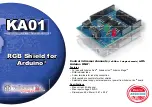Command processing never proceeds to execution when the parameter or protection
step fails. Instead, command processing is terminated after setting FSTAT[CCIF].
2. If the parameter and protection checks pass, the command proceeds to execution.
Run-time errors, such as failure to erase verify, may occur during the execution
phase. Run-time errors are reported in FSTAT[MGSTAT0]. A command may have
access errors, protection errors, and run-time errors, but the run-time errors are not
seen until all access and protection errors have been corrected.
3. Command execution results, if applicable, are reported back to the user via the
FCCOB and FSTAT registers.
4. The flash memory module sets FSTAT[CCIF] signifying that the command has
completed.
The flow for a generic command write sequence is illustrated in the following figure.
Clear the CCIF to launch the command
Write 0x80 to FSTAT register
Clear the old errors
Access Error and
Protection Violation
Check
FCCOB
ACCERR/
FPVIOL
Set?
EXIT
Write to the FCCOB registers
to load the required command parameter.
More
Parameters?
Availability Check
Results from previous command
Read: FSTAT register
Write 0x30 to FSTAT register
no
yes
no
yes
Previous command complete?
no
CCIF
= ‘1’?
yes
START
Figure 29-47. Generic flash command write sequence flowchart
Functional Description
K22F Sub-Family Reference Manual , Rev. 3, 7/2014
636
Freescale Semiconductor, Inc.


















